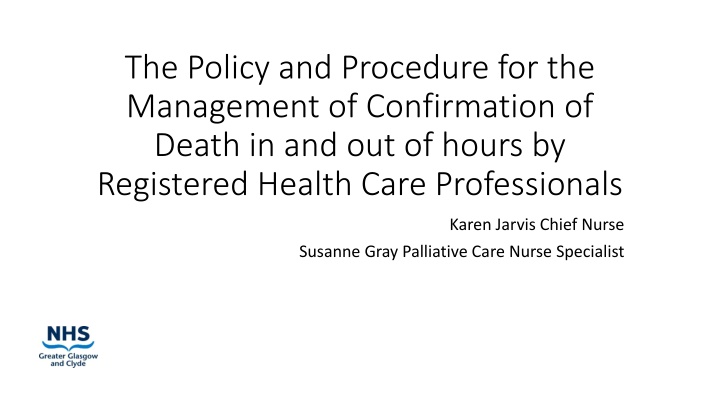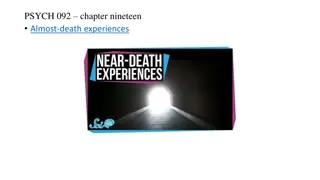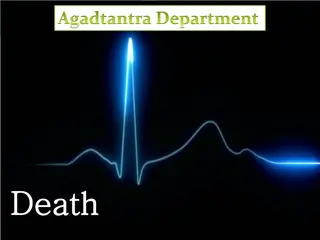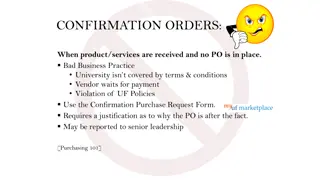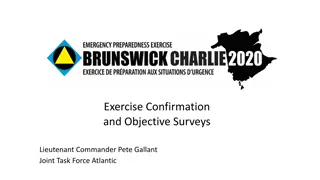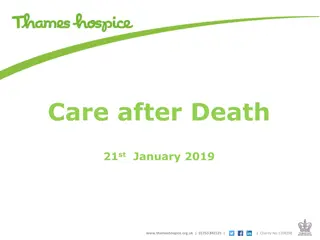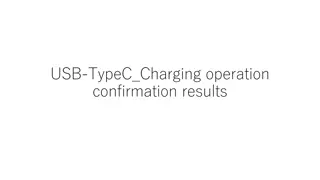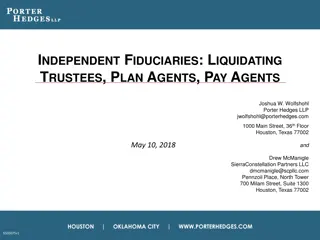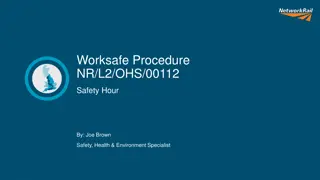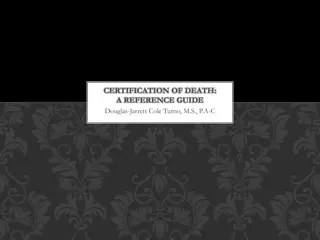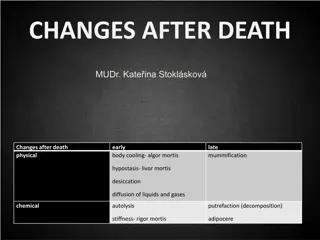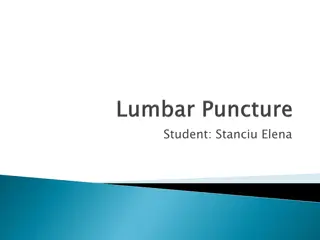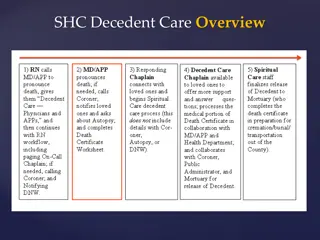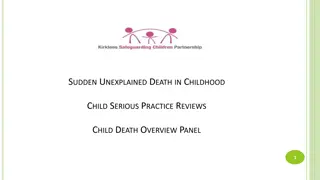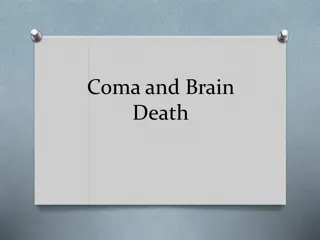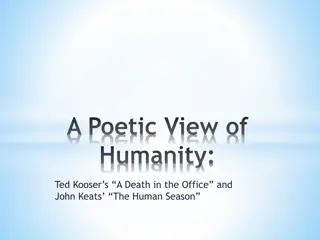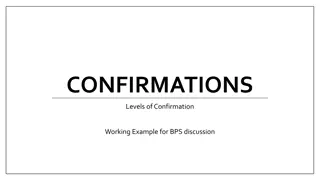Policy and Procedure for Confirmation of Death by Health Care Professionals
In May 2017, a policy change led to allowing trained Healthcare Professionals to verify death in all situations. The Confirmation of Death (CoD) policy empowers Registered Health Care Professionals to confirm death, while medical staff handle the Medical Certification of Cause of Death (MCCD). The process involves verification and confirmation, with specific clinical checks to confirm death. Implementation phases ensure a smooth transition to the new policy, supplementing existing processes for patients in community care settings.
Download Presentation

Please find below an Image/Link to download the presentation.
The content on the website is provided AS IS for your information and personal use only. It may not be sold, licensed, or shared on other websites without obtaining consent from the author.If you encounter any issues during the download, it is possible that the publisher has removed the file from their server.
You are allowed to download the files provided on this website for personal or commercial use, subject to the condition that they are used lawfully. All files are the property of their respective owners.
The content on the website is provided AS IS for your information and personal use only. It may not be sold, licensed, or shared on other websites without obtaining consent from the author.
E N D
Presentation Transcript
The Policy and Procedure for the Management of Confirmation of Death in and out of hours by Registered Health Care Professionals Karen Jarvis Chief Nurse Susanne Gray Palliative Care Nurse Specialist
Background In May 2017, a Directors Letter from the Chief Nursing Officer (CNO) [DL(2017)9] signalled a change in policy so that any trained Health Care Professional could verify death in all circumstances. NHS Education for Scotland (NES) have been leading on this with resources being developed over the last few months. The Confirmation of Death (CoD) policy permits any trained Registered Health Care Professional to confirm death in any circumstance. Medical Certification of Cause of Death (MCCD) remains the responsibility of medical staff.
The difference between verification and confirmation Verification of Expected Death Confirmation of Death Which patients? Any patient who a GP has completed a Verification of Expected Death form Any patient Who can verify/confirm? Any Registered Nurse who has completed Verification of Expected Death training The VOED trained Registered Nurse would complete the second and third parts of the VOED form which will be in the patient s home. Any Registered Health Care Professional who has completed Confirmation of Death Training The COD trained Registered Health Care Professional would bring a Confirmation of Death Recording Template when they go to confirm death. The Medical Certificate of Cause of Death (MCCD) can only be completed by a Registered Medical Practitioner Which form is used? Who can Certify Death? The Medical Certificate of Cause of Death (MCCD) can only be completed by a Registered Medical Practitioner
The Clinical Checks to Confirm Death Absence of carotid pulse confirmed over one minute AND Absence of heart sounds over one minute confirmed AND Absence of respiratory sounds/effort over one minute confirmed AND No response to painful stimuli (e.g. trapezius squeeze) confirmed AND Fixed dilated pupils (unresponsive to bright light) confirmed? Clinical checks performed over a period of 5 minutes
So what happens now? Phase 1 to be implemented immediately policy is approved Existing VOED policy, framework, documentation and training should remain in place until superseded by Confirmation of Death. The existing VoED process will be supplemented by phase 1 implementation of the new Confirmation of Death process involving key groups of nursing staff, for patients who die in the community who: are in a care home or on a district nurses caseload and do not have a VOED form in place.
Interim process 1 Process of referral When a person dies who has a VOED in place this policy and procedure should be followed. When a person dies and there is no VOED in place a referral should be made as follows for Confirmation of Death: In the community- In and Out of Hours to the DN SPOA In residential/Local Authority Care Homes where nursing interventions are currently carried out by District Nurses, referral as above. During the current situation there may be local agreements within independent Care Homes in conjunction with commissioning teams and Clinical Directors.
Interim process 2 The suitably trained and competent nurse can then arrange to attend and confirm the death following the NHS GGC policy for Confirmation of Death and the Confirmation of Death form. If there are no suitably trained and competent nurses available a GP will be asked to attend as is current practice. Once completed the form can be emailed to the clinical email box of the deceased s GP as is current practice. Complete the confirmation of death proforma, duplicate books available in order for staff to leave a copy for the undertaker. The form is also available on the NHS GGC palliative care CoD web page.
Resources to support Confirmation of Death NHS GGC Policy and procedure for the management of confirmation of death in and out of hours by health care professionals (Draft NHS GGC 2020) Draft NHS GGC Standard Operating Procedure Draft Guidance and supporting resources for practitioners undertaking the confirmation of death procedure in Scotland (NHS Education Scotland 2020) Frequently asked questions Confirmation of Death proforma Video demonstrating the procedure and clinical checks Pocket Card- Self care tips card for health care professionals Learnpro module Competency Framework
NHS GGC Palliative Care Website To help with access to all of the resources a new Confirmation of Death page has been added to the NHS GGC Palliative Care Website: https://www.palliativecareggc.org.uk/cod All NHS Education Scotland resources are available on the Support Around Death website and the TURAS COVID-19 site in the death and bereavement section http://www.sad.scot.nhs.uk/atafter-death/confirmation-of-death/ https://learn.nes.nhs.scot/28674/coronavirus-covid-19/death-and- bereavement
Training staff who are trained and experienced in Verification of Expected Death (VOED) Complete the Confirmation of Death Learn pro Watch the NES video on CoD Read the NES guidance and supporting resources Read the NHS GGC Policy (CoD) Read your local CoD SOP Download the CoD competency document and self-certify i.e. complete pages 1-3. A copy should then be kept in your portfolio/TURAS professional portfolio and inform your manager.
Training staff who have NOT undertaken VoED training Complete the Confirmation of Death Learn pro Watch the NES video on CoD Read the NES guidance and supporting resources Read the NHS GGC Policy (CoD) Read your local CoD SOP Download the CoD competency document and be assessed as competent by a colleague who is experienced in CoD i.e. complete pages 1-4. Assessment can be undertaken in a simulated environment. A copy should then be kept in your portfolio/TURAS professional portfolio and inform your manager.
What happens now? This is an interim implementation Review will be ongoing, a generic email has been set up to receive feedback cod@ggc.scot.nhs.uk A review date will be set
